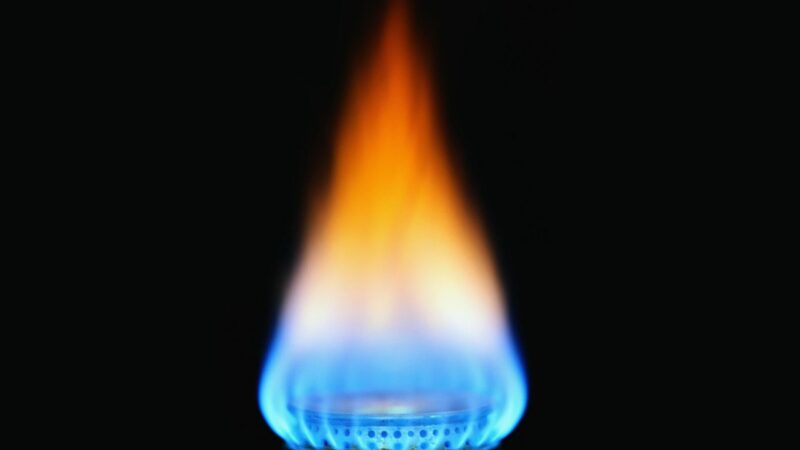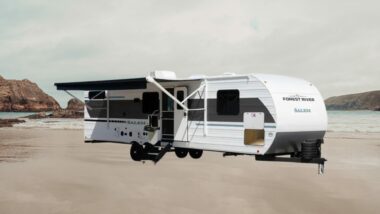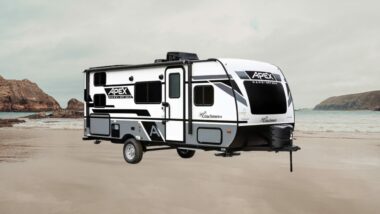Table of Contents Show
Do you enjoy winter camping? Even in late fall or early spring, nights can be chilly. So how do you save on propane so that you don’t have to fill up your cylinders every few days?
One Facebook user asked an RVing group for tricks to save on propane. Today, we’re looking more closely at this topic and providing our own tips to help you save money. Let’s dive in!
Why Do RVs Need Propane?
Propane, also called liquid petroleum, is necessary to run appliances and systems in RVs. It supplies power to your RV furnace and is the source of heat for many water heaters. If you’ve ever taken a cold shower in an RV, you know what it’s like to run out of propane at an inconvenient time.
An RV propane system will also provide fuel for RV stoves and ovens. If you enjoy cooking outside, you’ll likely need an outdoor connection to your propane lines to use your grill or skillet.
Some RV refrigerators also need propane to operate. These are often called 2-way fridges that use both propane and electricity depending on whether or not you are connected to shore power.

Is Propane Safe?
RVers tend to wonder if propane is safe. While propane is flammable and dangerous if leaked into an enclosed space, most RVers will never have problems with their propane systems. However, we recommend always purchasing a propane gas detector if your RV doesn’t come with one already installed.
Understanding how to properly use propane and how to detect warning signs of a gas leak is important when RVing. You always want to store and travel with propane cylinders in an upright position. Keep your propane turned off when traveling. This is required when entering tunnels but is a good idea every time you travel. You also want to inspect valves and hoses regularly to ensure that there are no leaks.
You shouldn’t be afraid of using your RV propane system. But you should understand how to properly use your propane system. It will be difficult to RV if you choose not to travel with propane.
How Much Is Propane?
Propane prices vary nationwide just like fuel prices. What you’ll pay at a campground in Virginia is likely different from what you’ll pay at a campground in Colorado. Generally, you can expect to pay $20-25 to refill a 20-pound tank. We’ve seen prices fluctuate between $3.50-4.50 per gallon on average.
Where you get your propane refilled will also affect the cost. Many campgrounds offer this service, and it’s convenient to just tote your cylinders to the refill station. However, it’s not always the cheapest option.
When searching for places to refill your propane at the cheapest cost, consider local gas companies. You’ll also find this service at supermarkets, fuel stations, home improvement stores, and U-haul centers. Tractor Supply and Costco often refill cylinders and sell new cylinders as well. However, refilling is cheaper than buying new cylinders. Unless your cylinders are expired, we don’t recommend buying new ones.
Some places will charge by the gallon while others will charge for the overall size of your cylinder. For example, if you’re not quite empty but want to go ahead and refill your propane cylinder, you’ll want to find a place that charges by the gallon. You don’t want to have to pay for an entire 20-pound tank when you only need half of it filled.
Pro Tip: Be sure to read How To Recertify Your RV Propane Tanks so that you can keep your RV certifications up to date!
6 Tips To Conserve Propane During Winter
Propane isn’t cheap. If you’re connected to shore power, you may choose alternatives like space heaters or electric fireplaces to warm your RV. However, you’ll need propane to operate your furnace if you’re camping in colder climates.
You’ll also use your stove, oven, refrigerator, and water heater, which may all use propane as their energy source. Here are a few tips to conserve propane this winter.
1. Use Reflectix
Reflectix is a reflective foil that goes on the inside of your RV windows. It keeps the cold air outside and warm air inside. It’s like insulation. During the summer, it helps keep the hot air outside and cool air inside. By using this foil, your furnace, which runs off of propane, won’t turn on as often.
- EFFECTIVE RADIANT HEAT REFLECTION – Reflectix Reflective Radiant Barrier Insulation Roll reflects up to 97% of radiant…
- DURABLE DOUBLE BUBBLE FOIL DESIGN – This 24″ x 10′ insulation foam roll features a robust double bubble foil structure…
2. Use Portable Heaters
Portable heaters provide another heat source. Instead of running your propane furnace, you can plug in a heater in your bedroom. For people who usually have electric hookups, this is no problem. If you tend to boondock more often, portable heaters will use more power and might not be the best option. You’ll have to choose which is worth considering more: propane or electricity.

3. Use Electric Appliances
Instead of using the appliances that require propane, consider bringing along electric apppliaces. Use an Instant Pot, crock pot, convection microwave, or air fryer when cooking. Use a portable stove top outside instead of a Blackstone grill. Again, if you’re boondocking, these options may not be better. But if you have hookups, electric appliances will save some propane.
4. Use the Bathhouse
Water heaters often use propane as their heat source. Some water heaters are electric. But if you have a water heater that requires propane, use the bathhouse when showering or washing dishes. When boondocking, this also helps to conserve water and reduces the amount of waste in your tanks. But even if you have hookups, you won’t have to use as much propane if you use the hot water in the bathhouse.
5. Cuddle Up With Blankets
It’s so simple, but don’t discount the warmth that a few blankets provide. Set the thermostat lower and use blankets when you get chilly. Layer your bed with blankets so you can add warmth at night. Cozy up on the sofa with a blanket while you’re watching a movie instead of cranking up the heat.

6. Go Exploring
Finally, if you want to find ways to conserve propane, get out of your RV. Go on a hike, visit a local attraction, or just stay outside at the campsite. You can set the thermostat lower since you’re not inside your RV. Then the propane furnace won’t kick on as often. Save the propane for nighttime when it gets the coldest and you’re seeking warmth as you sleep.
Save Money When Camping By Conserving Propane
Propane is an essential fuel source when RVing. But it can also get expensive if you’re having to refill your cylinders every few days. Hopefully, these tips will help you conserve propane and save money the next time you hit the road!
We don’t want you to freeze, but we also want more money in your pocket to do the fun things like a horseback riding, a whitewater rafting adventure, or a night out at a local hot spot. Do you have any other suggestions you’d offer to help RVers conserve propane?
Last update on 2025-06-29 / Affiliate links / Images from Amazon Product Advertising API







